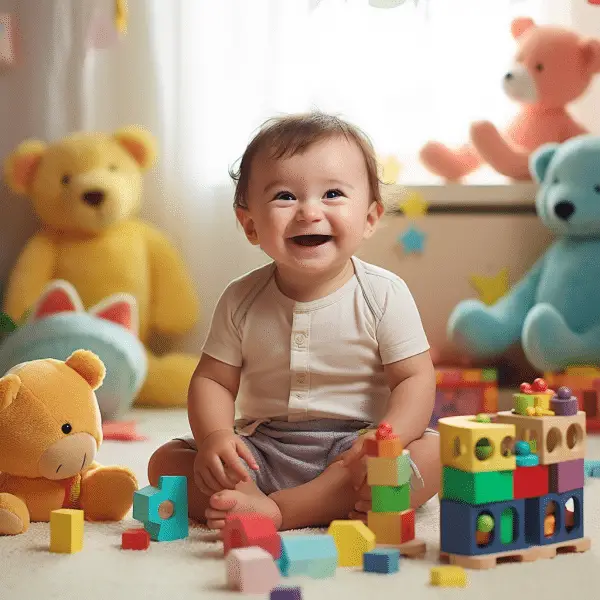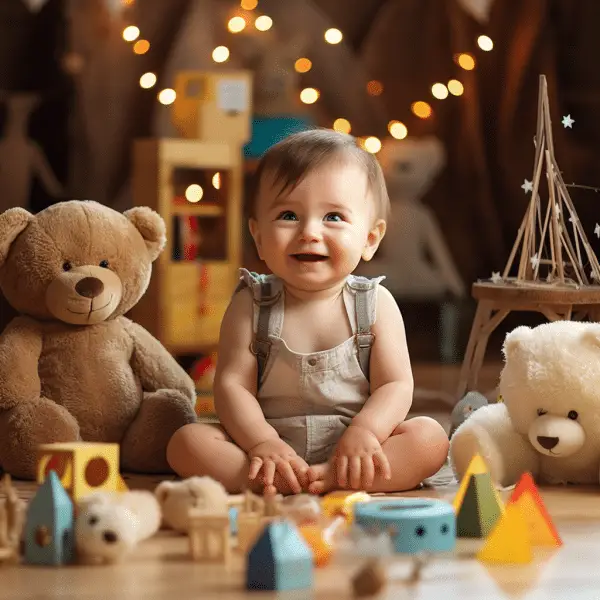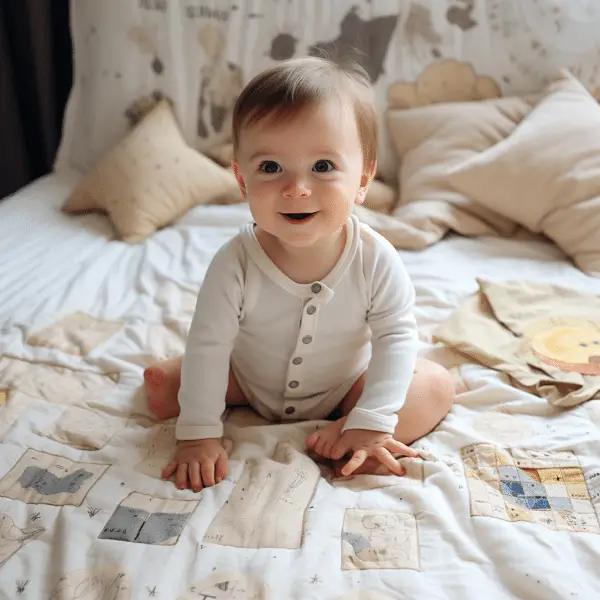Baby’s First Year: Milestones, Memories, and Play
As a parent, capturing and cherishing the milestones of your baby’s first year is a priceless experience. From their first smile to their first steps, each milestone is a testament to their growth and development. In this article, I will explore the importance of tracking these milestones, the different areas of development they encompass, and how you can enhance your baby’s growth through play and interaction. Let’s dive into the magical journey of your baby’s first year!
Key Takeaways:
- Tracking your baby’s milestones is vital for monitoring their development and ensuring they reach important stages of growth.
- Milestones encompass cognitive, social and emotional, physical, and language development.
- Nurturing these milestones through play and interaction can enhance your baby’s overall growth.
- Partnering with a pediatrician can provide valuable guidance and support in tracking your baby’s milestones.
- Preserving memories and celebrating milestones through scrapbooks and special moments can create lasting memories of your baby’s journey.

The Importance of Tracking Baby’s Milestones
Keeping track of your baby’s milestones is vital to monitoring their development. By recording their first-year milestones, you can gauge their progress and ensure they are reaching important developmental stages. Milestones in areas such as cognition, social skills, physical abilities, and language development can provide valuable insights into your baby’s growth and well-being.
Tracking your baby’s milestones allows you to identify any potential delays or concerns early on, giving you the opportunity to seek appropriate intervention if needed. It also helps you celebrate and cherish the milestones your baby achieves, creating a beautiful record of their growth and development.
As you track your baby’s milestones, you may notice patterns and trends in their development. This can give you a deeper understanding of their unique strengths and areas that may require additional attention or support. By having a clear picture of their progress, you can actively engage in activities and interactions that promote their overall development.
Tracking your baby’s milestones is an empowering way to actively participate in their growth journey. It allows you to celebrate their achievements, identify any potential concerns, and provide the necessary guidance and support for their development.
The Importance of Tracking Baby’s Milestones
| Area | Milestones |
|---|---|
| Cognition | Finding hidden objects, following simple instructions, engaging in basic problem-solving activities |
| Social Skills | Expressing joy, crying when upset, showing attachment to toys, exhibiting social behaviors like waving |
| Physical Abilities | Crawling independently, pulling up to stand, walking with support, developing fine motor skills |
| Language Development | Responding to their name, understanding simple phrases, saying simple words, comprehending “no” |
Cognitive Milestones
The cognitive milestones of a baby’s development are crucial indicators of their learning, thinking, and problem-solving abilities. By the age of one, babies should achieve certain cognitive milestones that demonstrate their growing understanding of the world around them.
Object Permanence
One significant cognitive milestone is the development of object permanence. This refers to the understanding that objects continue to exist even when they are out of sight. By the age of one, babies should be able to find hidden objects, indicating that they have acquired this concept.
Simple Instructions
Another cognitive milestone is the ability to follow simple instructions. By one year old, babies should be able to comprehend and respond to basic commands or requests, such as “Give me the toy” or “Wave bye-bye”. This showcases their growing understanding of language and their ability to process and act upon verbal cues.
Problem-Solving Skills
Basic problem-solving abilities are also important cognitive milestones. By one year old, babies should show some capacity for problem-solving, such as figuring out how to open a container or stack blocks. These skills indicate their growing ability to think critically and find solutions to simple challenges.
| Cognitive Milestones | Achievements by One Year |
|---|---|
| Object Permanence | Ability to find hidden objects |
| Understanding Simple Instructions | Following basic commands or requests |
| Problem-Solving Skills | Ability to find solutions to simple challenges |
Social and Emotional Milestones
Social and emotional milestones are crucial for a baby’s development. By one year old, babies should be able to express joy, cry when upset, and find humor in simple games. They may also start showing attachment to favorite toys and exhibit social behaviors like waving “hi” or “bye.” Nurturing these milestones by playing simple games and providing social environments can enhance their social and emotional growth.
Important Social Milestones
- Expressing joy and happiness
- Crying when upset or in need
- Beginning to show attachment to favorite toys
- Exhibiting basic social behaviors like waving “hi” or “bye”
Developing Emotional Skills
- Recognizing and responding to the emotions of others
- Expressing a range of emotions
- Seeking comfort from caregivers
- Showing empathy towards others
“A baby’s social and emotional milestones are essential for their overall growth and well-being. By creating a nurturing and supportive environment, parents can help their babies develop important social skills and emotional understanding.”
Providing opportunities for social interaction with family members, caregivers, and peers is crucial in helping babies develop essential social and emotional skills. Simple games and activities that encourage emotional expression and social bonding, such as peek-a-boo or tickling games, can foster healthy development in these areas. It’s important to remember that each baby develops at their own pace, so it’s essential to provide patience, support, and encouragement throughout their journey of social and emotional growth.
| Social Milestones | Emotional Milestones |
|---|---|
| Expressing joy and happiness | Recognizing and responding to the emotions of others |
| Crying when upset or in need | Expressing a range of emotions |
| Beginning to show attachment to favorite toys | Seeking comfort from caregivers |
| Exhibiting basic social behaviors like waving “hi” or “bye” | Showing empathy towards others |
The Physical Milestones of Baby Development
Physical milestones play a crucial role in a baby’s overall development. These milestones encompass the growth of their motor skills, both gross and fine, which enable them to explore the world around them and gain independence. By the end of their first year, babies should achieve a range of physical milestones that set the foundation for future physical abilities.
Table: Physical Milestones in Baby Development
| Physical Milestone | Developmental Age |
|---|---|
| Rolling over from front to back | 3-6 months |
| Sitting without support | 6-8 months |
| Crawling independently | 8-10 months |
| Pulling themselves up to stand | 9-12 months |
| Walking while holding onto furniture or support | 10-12 months |
| Picking up small objects with thumb and pointer finger | 10-12 months |
These physical milestones are indicative of a baby’s growing strength, coordination, and motor skills. They enable them to explore their environment, interact with objects, and eventually gain the ability to walk independently. As a parent or caregiver, you can support your baby’s physical development by providing opportunities for them to practice these skills through play, tummy time, and supervised exploration.
H3: Encouraging Physical Milestones
Encouraging physical milestones can be done through various activities and interactions:
- Placing toys just out of reach to encourage your baby to reach, crawl, or pull themselves up
- Supervised tummy time to strengthen neck, back, and shoulder muscles
- Providing safe and supportive furniture or objects for your baby to practice standing and cruising
- Offering age-appropriate toys that encourage fine motor skills, such as stacking blocks or shape sorters
- Engaging in physical play, such as gently bouncing or swinging your baby
By providing a nurturing and stimulating environment, you can help your baby reach their physical milestones and set the stage for their continued growth and development.
Language Milestones
During a baby’s first year, they go through remarkable language milestones that are indicative of their overall development. These milestones involve their ability to understand and communicate through language, setting the foundation for their future language skills. Let’s explore some of the key language milestones that babies typically achieve by the age of one.
First Words and Understanding
By the age of one, babies start to say their first simple words like “mama” or “dada.” This is an exciting milestone that shows their growing ability to use language to communicate basic needs and desires. Additionally, babies can also understand simple phrases and follow simple instructions given to them.
Receptive Language Skills
Babies at this stage can respond to their own name and comprehend the meaning of words like “no.” They may also wave “hi” or “bye” in appropriate situations, demonstrating their understanding of social cues. These receptive language skills are crucial for their social and cognitive development.
Building Vocabulary
As babies approach their first birthday, their vocabulary starts to expand. They may begin to recognize and name familiar objects, animals, or people in their immediate environment. Encouraging their language development through reading books, talking to them, and pointing to objects can greatly enhance their vocabulary skills.
| Milestone | Description |
|---|---|
| First Words | Babies start saying their first simple words like “mama” or “dada.” |
| Understanding Simple Phrases | Babies can understand and follow simple phrases given to them. |
| Receptive Language Skills | Babies respond to their own name and comprehend words like “no.” |
| Building Vocabulary | Babies recognize and name familiar objects or people. |
Language milestones are an essential part of a baby’s development. By encouraging their language skills and providing a language-rich environment, parents can support their baby’s communication abilities and foster their overall growth.
The Importance of Partnering with a Pediatrician for Developmental Tracking
When it comes to tracking your baby’s development, partnering with a pediatrician is essential. These healthcare professionals have the expertise and knowledge to provide the necessary care and guidance at each stage of your baby’s growth. Regular check-ups and consultations with a pediatrician can help ensure your baby is achieving their milestones and address any concerns or questions you may have.
Why Choose a Pediatrician?
Pediatricians specialize in the care of infants, children, and adolescents, making them the ideal partner for tracking your baby’s developmental progress. They have extensive training in child health and development, allowing them to monitor and assess your baby’s growth milestones accurately. Pediatricians can provide valuable insights and recommendations based on their vast knowledge and experience.
During routine visits, your pediatrician will conduct thorough physical examinations, assess your baby’s developmental milestones, and address any concerns you may have. They will track important milestones, such as cognitive, social, emotional, physical, and language development, to ensure your baby is progressing as expected.
Building a Collaborative Relationship
Partnering with a pediatrician creates a collaborative relationship centered around your baby’s well-being. By working together, you and your pediatrician can ensure that your baby receives the appropriate care and support to reach their developmental milestones. They can offer valuable guidance on various topics like nutrition, sleep patterns, and age-appropriate activities to enhance your baby’s growth and development.
A pediatrician can also address any concerns or questions you may have about your baby’s development. They are there to offer reassurance, provide expert advice, and guide you through each stage of your baby’s journey. By having open and honest communication with your pediatrician, you can gain peace of mind and confidence in your baby’s development.
Maintaining a Lifelong Connection
Partnering with a pediatrician for developmental tracking is not only beneficial for your baby’s first year but also for their long-term health and well-being. Continuity of care is crucial, as your pediatrician can monitor your child’s growth and development as they progress through childhood and adolescence. This lifelong connection provides a comprehensive understanding of your child’s health history and allows for early detection of any potential issues.
By partnering with a pediatrician, you can ensure that your baby receives the best possible care and support for their overall development. Regular visits and consultations with a trusted healthcare professional empower you to make informed decisions and provide the necessary interventions to enhance your baby’s growth and well-being.
| Benefits of Partnering with a Pediatrician: |
|---|
| Expertise in child health and development |
| Accurate monitoring of developmental milestones |
| Thorough physical examinations |
| Guidance on nutrition, sleep patterns, and activities |
| Addressing concerns and providing reassurance |
| Continuity of care throughout childhood and adolescence |
Preserving Memories and Celebrating Milestones
As your baby grows and develops, it’s important to cherish the memories and celebrate the milestones of their first year. These precious moments create a lasting bond and serve as a reminder of their incredible journey. There are several ways you can preserve these memories and create a meaningful tribute to your little one’s growth.
Creating Scrapbooks or Photo Albums
One popular method of preserving memories is by creating scrapbooks or photo albums. These allow you to capture special moments through pictures, notes, and mementos. You can document your baby’s milestones, such as their first smile, first steps, or first birthday, and include heartfelt messages or captions to accompany each memory. Adding a personal touch with decorative elements and creative layouts can make these albums even more special.
Writing Letters or Journal Entries
Another beautiful way to preserve memories is by writing letters or journal entries to your baby. You can express your feelings, share anecdotes, and recount significant moments. These letters or journal entries can serve as a time capsule, allowing you and your child to revisit these precious memories in the future. Reading these heartfelt words together can create a strong emotional connection and provide a window into their early years.
Celebrating Special Moments
Alongside preserving memories, celebrating milestones is equally important. Milestones such as their first tooth, first word, or first solid food can be celebrated in memorable ways. You can organize a small gathering with family and friends, create a special themed photo shoot, or plan a unique outing to commemorate these significant achievements. These celebrations not only honor your baby’s progress but also create lasting memories for everyone involved.
| Milestone | Celebration Ideas |
|---|---|
| First Birthday | Throw a themed party, take professional photos, create a time capsule |
| First Steps | Arrange a walking milestone ceremony, capture a video of their first steps |
| First Tooth | Organize a tooth fairy visit, create a tooth fairy keepsake box |
By preserving memories and celebrating milestones, you are creating a treasure trove of moments that will be cherished for a lifetime. These tangible reminders of your baby’s growth and development will provide joy and nostalgia as they continue to grow. Embrace the magic of their first-year journey and savor every precious moment.
Enhancing Development through Play and Interaction
Play and interaction play a crucial role in stimulating a baby’s overall development. Engaging in activities that promote cognitive, social, emotional, and physical skills can help babies reach their milestones and foster healthy growth. By creating a nurturing and stimulating environment, parents can provide valuable learning experiences that aid in their baby’s development.
Simple games are an effective way to enhance cognitive skills. Activities such as peek-a-boo or hide-and-seek can help babies develop object permanence and problem-solving abilities. Playing with building blocks or shape sorters can improve their spatial awareness and fine motor skills. These interactive games not only entertain but also contribute to their cognitive milestones.
Social interaction is crucial for babies to develop their social and emotional skills. Encouraging interactions with family members, peers, and caregivers helps babies learn to communicate, express emotions, and form attachments. Rattles, plush toys, and mirrors can provide opportunities for babies to engage in social play, stimulating their emotional development.
“Play is often talked about as if it were a relief from serious learning. But for children, play is serious learning.” – Fred Rogers
Benefits of Interactive Toys
| Toy | Benefits |
|---|---|
| Activity Gym | Stimulates motor skills and sensory development |
| Stacking Rings | Enhances hand-eye coordination and problem-solving skills |
| Musical Toys | Improves auditory perception and rhythm recognition |
| Shape Sorters | Develops spatial awareness and problem-solving abilities |
Interacting with babies through play not only promotes their development but also strengthens the bond between parent and child. The joy, laughter, and shared experiences create a positive and nurturing environment that supports their overall growth. By incorporating play and interaction into daily routines, parents can make a significant impact on their baby’s developmental journey.
The Role of Parental Guidance in Milestone Achievement
Parental guidance plays a vital role in supporting and nurturing a baby’s milestone achievement. As parents, we have the power to create a nurturing and stimulating environment that fosters our baby’s overall development. By offering encouragement, praise, and engaging in activities that promote their growth, we can significantly impact their progress.
One of the key ways parents can provide guidance is by creating a structured routine that allows for consistent and predictable interactions. This helps babies feel secure and encourages them to explore and learn. By establishing regular playtimes, reading sessions, and daily interactions, we can support their cognitive, social, emotional, and physical development.
It’s important to remember that each baby has their own unique pace of development, and milestones are achieved at different times. As parents, we should avoid comparing our baby’s progress to others and instead focus on providing the necessary support and encouragement. Celebrate each milestone achieved, no matter how small, and offer reassurance and patience when they face challenges.
In addition to providing guidance, it’s crucial for parents to seek professional advice from pediatricians or family medicine physicians. Regular check-ups and consultations with healthcare professionals can help ensure that our baby is on track with their milestones and provide guidance on any concerns or questions we may have. Together, we can form a collaborative partnership in our baby’s development journey.

Conclusion
The first year of a baby’s life is an incredible journey filled with precious milestones and cherished memories. It is during this time that parents witness their little ones grow and develop at a remarkable pace. By tracking and celebrating these milestones, partnering with a pediatrician, preserving memories, and providing guidance and interaction, parents play a vital role in ensuring their baby’s healthy development.
Tracking and documenting baby milestones offer valuable insights into their growth and well-being. From cognitive and social-emotional milestones to physical and language development, each milestone achieved represents a significant step forward in their overall progress. By recognizing these milestones, parents can actively participate in their baby’s journey and nurture their growth.
Partnering with a pediatrician or family medicine physician is essential for comprehensive developmental tracking. Regular check-ups and consultations enable healthcare professionals to monitor the baby’s milestones, address any concerns, and provide the necessary guidance at each stage. This collaboration ensures that parents have the support and expertise they need to navigate their baby’s development confidently.
Preserving memories and celebrating milestones allows parents to cherish the journey of their baby’s first year. Creating scrapbooks, writing letters or journal entries, and commemorating special moments create lasting memories that can be shared and treasured for years to come. These cherished mementos serve as a beautiful reminder of the incredible growth and development experienced during this transformative time.
FAQ
Why is it important to track my baby’s milestones?
Tracking your baby’s milestones is vital to monitoring their development and ensuring they are reaching important developmental stages.
What are cognitive milestones and why are they important?
Cognitive milestones involve learning, thinking, and problem-solving habits. They are essential for your baby’s cognitive development and indicate their ability to absorb information and understand their surroundings.
What are social and emotional milestones?
Social and emotional milestones are crucial for your baby’s development. They involve expressing joy, crying when upset, finding humor in games, and exhibiting social behaviors like waving “hi” or “bye.” Nurturing these milestones enhances their social and emotional growth.
What are physical milestones?
Physical milestones encompass motor skills such as crawling, standing, and walking. They also include fine motor skills like picking up small objects. Encouraging these milestones through play and support aids in your baby’s physical development.
What are language milestones?
Language milestones involve your baby’s ability to understand and communicate through language. They include responding to their name, understanding simple phrases, and beginning to say simple words. Reading books and talking to them can support their language development.
How can a pediatrician help in tracking my baby’s milestones?
Pediatricians have the education and experience to provide necessary care and guidance at each stage of your baby’s development. Regular check-ups and consultations with a pediatrician can help ensure your baby is achieving their milestones and address any concerns.
How can I preserve memories and celebrate milestones?
You can create scrapbooks or photo albums, write letters or journal entries, and celebrate special moments to preserve and celebrate your baby’s journey. These cherished memories will serve as a reminder of their growth and development for years to come.
How can play and interaction enhance my baby’s development?
Engaging in activities that stimulate your baby’s cognitive, social, emotional, and physical skills can help them reach their milestones. Simple games, toys, and social interactions provide valuable learning experiences and foster healthy development.
What role do parents play in milestone achievement?
Parents play a crucial role in supporting their baby’s milestone achievement. Providing a nurturing and stimulating environment, offering encouragement and praise, and engaging in activities that promote their development significantly impact their progress.






